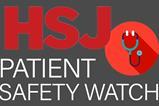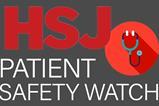HSJ is now hosting the Patient Safety Watch newsletter, written by Patient Safety Watch chief executive James Titcombe.
Good afternoon and welcome to the latest edition of the Patient Safety Watch newsletter.
In this edition, we are sharing a guest blog from Chris Day, director of engagement at the Care Quality Commission, focusing on CQC’s State of Care report published this week. Before handing over to Chris, here is the usual round-up of patient safety news.
One year on from East Kent – families say progress ‘too slow’
Last week marked one year since the publication of the East Kent report. The report, chaired by Bill Kirkup (published October 2022) investigated maternity and neonatal services at East Kent Hospitals University Foundation Trust over an 11-year period, from 2009. The inquiry found that of 202 cases reviewed by the expert panel, the outcome could have been different in 97 cases.
Helen Gittos, whose daughter died in 2014, told ITV News Meridian: “Talking to people who are working with the [East Kent Hospitals] Trust, and from talking to people who have got recent experience of using the service, there really hasn’t… been enough change at all.”
Speaking to BBC News, Victoria, whose six-year-old daughter needs 24-hour support and whose case was one that was examined by Dr Kirkup in his report said: “I’ve had no contact from anyone from the trust… I don’t feel lessons have been learned whatsoever.”
Telford baby’s death at scandal-hit trust was preventable
An inquest into the tragic death of baby Poppy Russell has concluded this week. Poppy died a few hours after her birth on 11 April 2021 at Princess Royal Hospital in Telford, part of the Shrewsbury and Telford Trust. As reported by the BBC, coroner John Ellery said there would have been signals between 02:00 and 03:15 that Poppy was suffering and displaying symptoms of intermittent compression of her umbilical cord.
“These signals should have been picked up and in the situation which unfolded there was a failure to do so, leading to Poppy’s preventable death,”
Speaking after the inquest, Poppy’s parents Katie and Neil Russell, said they were heartened by Mr Ellery’s conclusion and would continue to campaign for change adding: “Throughout the process the trust has blamed us… This is unforgivable and we hope the coroner’s finding of neglect makes them reflect on the way the trust tried to hold us accountable for Poppy’s death.”
Ambulance, mental health and maternity care in ‘notable decline’, warns watchdog
The CQC’s annual State of Care report has raised concerns about the safety and quality of care in several NHS services, including ambulance, mental health and maternity.
The watchdog’s report also highlighted growing inequalities, warning of a possible “two-tier system” where people who couldn’t afford to pay waited longer for care and got sicker while waiting.
Focusing on maternity care, the report paints a worsening picture, with the number of maternity units with an overall rating of “inadequate” or “requires improvement” now standing at 49 per cent – up from 39 per cent the year before. Looking specifically at CQC’s ratings for “safety”, 65 per cent of maternity services currently fall below “good”.
CQC also draw attention to racial inequalities, using a quote from a midwife from a minority ethnic background, who said: “The NHS is amazing, but it was built by white people for white people.”
Read more about CQC’s State of Care report in our guest blog, from CQC’s director of engagement Chris Day at the end of this newsletter.
In other news this edition:
Sepsis failings still happening a decade on
A new report from the Parliamentary and Health Service Ombudsman has warned the same hospital failings it observed in a 2013 report are still leading to sepsis deaths. Problems include diagnosis and treatment delays, poor communication and record keeping, and missed opportunities for follow-up care.
Ombudsman Rob Behrens said: “I’ve heard some harrowing stories about sepsis through our investigations, and it frustrates and saddens me that the same mistakes we highlighted 10 years ago are still occurring. It is clear that lessons are not being learned…
“The NHS needs to listen to patients and their families when they raise concerns. It needs to be sepsis aware. We know early detection and treatment is crucial. It is time to make sure complaints count, and patients’ voices are used to shape action on sepsis that is urgently needed.”
Most trusts thought to have missed patient safety deadline
The majority of trusts are thought to have missed the deadline for the new learning from patient safety events incident reporting system. HSJ has learned that, during a patient safety management network meeting last month, 70 per cent of those polled said their organisation would not be ready to go live by 30 September.
The launch date for the new platform, which is replacing the historic national reporting and learning system, has already been delayed by six months. Its original March implementation date was moved back, following multiple and varied concerns from patient safety managers.
Top doctor calls for ‘black alerts’ for GPs
The Guardian has reported that Royal College of GPs chair Kamila Hawthorne has called for a “black alert” system for GPs – similar to the Opel system which exists in hospitals – which would signal when surgeries have reached dangerous levels of capacity.
Under the system, GPs would be able to alert their local system to unsafe workloads and suspend non-priority activities temporarily during periods of excessive demand.
The call came as a RCGP survey revealed 46 per cent of GPs felt they did not have enough time in appointments to make sure patients were safe.
Professor Hawthorne said: “General practice is a safety-critical industry yet GPs have none of the mechanisms that other safety-critical professions, such as the air traffic industry, have in place to protect them.”
Coroners’ safety warnings not being heeded
A report published by the Independent Advisory Panel on Deaths in Custody has found coroners’ prevention of future deaths reports – which are issued following inquests where the court feels an organisation should take action to prevent further deaths – were not as effective as they could be.
IAPDC’s report made several recommendations, including that PFDs should be shared widely and taken as an opportunity to improve, and the chief coroner’s office should receive more funding to improve its oversight of the process.
IAPDC chair Lynn Emslie said: “Our report identifies a range of improvements to ensure the preventive potential of PFD reports is fully realised and that lessons are truly learned from these often avoidable incidents.”
Letby Inquiry: terms of reference published
The Thirlwall Inquiry, set up to examine events at the Countess of Chester Hospital and their implications following the trial, and subsequent convictions of Lucy Letby has now published its terms of reference. This follows an engagement process led by the inquiry’s independent chair, Lady Justice Thirlwall, with the affected families and other stakeholders.
The agreed terms of reference cover three broad areas:
- the experiences of the parents of the babies named in the indictment
- the conduct of clinical and non-clinical staff and management, as well as governance and escalation processes in relation to concerns being raised about Lucy Letby and whether these structures contributed to the failure to protect babies from her
- the effectiveness of governance, external scrutiny and professional regulation in keeping babies in hospital safe, including consideration of NHS culture
The inquiry is set to begin in November 2023.
Government’s patient safety progress to be examined
The Commons health select committee has announced its expert panel will next be scrutinising the government’s progress against patient safety recommendations it has previously agreed to put in place.
Committee chair Steve Brine said: “We’ve now had a large number of public inquiries, around failures in patient safety, and we owe it to them all before we embark on another one to see if what’s been recommended before has actually happened.”
Expert panel chair Dame Jane Dacre added: “The confidence of patients in the NHS can be shattered when failures in patient safety make headlines… We want to find out what progress has been made by the government on recommendations it has accepted to improve patient safety in the NHS.”
The health select committee has done superb work in the past and Dame Jane Dacre is the right person to lead this important work. We’ll be keeping a close eye on the evaluation and its findings and recommendations.
That brings this edition to an end but please do read our guest blog below. Chris shares some important messages that resonate with many of the stories shared here.
Please look out for our next newsletter on 10 November. In the meantime, thanks for reading and please stay safe.
James Titcombe
Towards fairer care
Chris Day, director of engagement - CQC
Last week, CQC published our annual State of Care report. It warned that despite the efforts of people who work in the health and care system a combination of the cost-of-living crisis and escalating workforce pressures is leading to unfair care – longer waits, reduced access, and poorer outcomes for some.
In the face of these longer waits, those who can afford it are increasingly turning to private healthcare. This risks a two-tier health system, with people getting the care they can afford, rather than the care they need.
Many of the challenges described in this year’s State of Care are to some degree caused by a lack of joined-up planning, investment and delivery of care. Integrated care systems offer an opportunity to address some of these challenges – given the right support and with a clear focus on reducing inequalities.
However, the need for a long-term sustainable plan for care outside hospitals makes the task for ICSs more challenging.
In addition, the continuing impact of covid can be seen not only on elective waiting lists but on an exhausted, depleted workforce who battled through a pandemic and whose unhappiness with pay and conditions has now culminated in industrial action.
The fact that only a quarter of NHS staff are satisfied with their pay tells its own story. But when we spoke to health and care professionals, they also called for improvements in meeting the basic needs of staff, including regular breaks, places to rest, safe working environments, and flexible work schedules to enable caring and other responsibilities, alongside their psychological needs.
They told us they want employers and leaders to:
- be visible in championing workforce wellbeing.
- demonstrate a proactive as well as a reactive response to workforce wellbeing. For example, implementing a wellbeing strategy that understands the needs of their workforce with supportive measures that allow them to thrive – rather than focusing all resources and initiatives on reacting to burnout.
- provide a culture where the workforce feels listened to and has regular opportunities to give feedback.
- understand their workforce and meet the needs of different staff groups, especially those who might need tailored support, such as internationally recruited staff or those with certain protected equality characteristics.
- nurture the professional development of staff through training and regular appraisal.
Our report also highlights concerns about maternity services. We saw examples of good care and of services taking action to manage staff shortages safely – and it was encouraging that all units inspected so far have adjusted consultant cover to meet Ockenden recommendations.
However, we also saw issues with governance and lack of oversight from boards, delays to care, poor communication with women and difficult working relationships between staff groups.
We spoke to midwives from ethnic minority groups who told us that care for women using maternity services is affected by racial stereotypes and a lack of cultural awareness among staff. They highlighted a number of actions that leaders and managers could take to ensure a more equitable experience both for women using services and the staff working in them, including:
- channels for staff and people using services to feel safe in reporting inequitable care – and approachable senior people with accountability.
- more availability and use of translation services and interpreters to help people who do not speak English to navigate their care.
- increasing the knowledge of staff about cultural practices and traditions, to address misconceptions and misunderstandings and to tackle unconscious bias.
- outreach and engagement with ethnic minority communities to better understand and address the needs and concerns of people using maternity services.
It would be simplistic to suggest that there is any single answer to the multiple challenges that healthcare leaders are facing. But a focus on the wellbeing of staff, on understanding cultural differences and on fostering a culture where concerns are listened to and acted upon can only have a positive impact on patient care – meaning a step closer to fairer care for everyone.































No comments yet